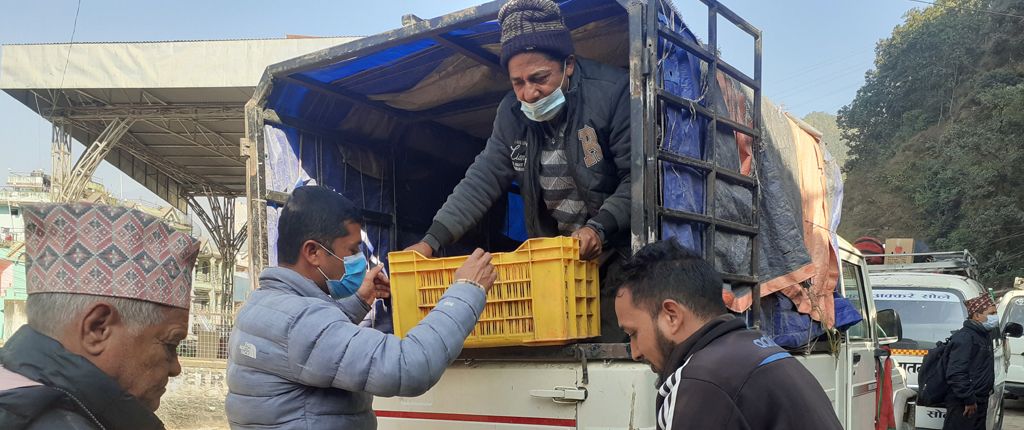
Strengthening Resilience in Earthquake-Affected Communities in Nepal
Frequent earthquakes, low economic income, lack of access to clean water, low capacity in disaster preparedness and widespread stigma of mental illness paint the picture of many communities in Nepal. On top of that, the Covid-19 pandemic and its impacts add a heavy burden. To provide holistic support to the vulnerable populations of Nepal, however, we have set up an inclusive community development project to fortify resilience and help disaster-affected communities in the district of Nuwakot to overcome the damages of the Covid-19 pandemic.
To achieve this, we cooperate with our two Nepalese partner organisations RSDC and KOSHISH.
In the rural community of Panchakanya (population: 16.388) in the district of Nuwakot, North of the capital city Kathmandu, natural disasters such as earthquakes, landslides and floodings are a frequent occurrence. In 2015, the severe earthquake hit the region especially hard. Many lost their lives and people’s land and possessions suffered great damage. The people in Panchakanya, mainly consisting of ethnic minorities and lower caste members, who already had difficulties to defend their livelihoods prior to the event, became even more marginalized. The earthquake, its effects (erosions, landslides, water shortages), weak infrastructure and unplanned land usage led to degradation, i.e. the deterioration of already scarce agricultural land. Communities lack capacities to increase their harvest or create alternative income opportunities. Additionally, there is not enough awareness on prevention methods that could help communities to become more adaptive and resilient. These adverse living conditions often lead to strong psychological strain on people – especially after major disasters. In many places, however, the issue of mental health is stigmatized. Education about causes and treatment options by the health care system is not widespread.
Covid-19 Situation in Nepal
Nepal was no exception to the many restrictions on public life that were introduced during the pandemic. Besides the positive impact of the lockdown (contained spread of new cases) the population has been battling with acute income losses, a restricted supply of essential goods, and the psychological impacts of self-isolation and social distancing regulations. After the mutation of the Delta variant in April 2021, the number of daily new infections and death cases reached skyrocketing heights by May 2021, driving the healthcare system to its limits and into a state of emergency.
The aim of the project is to strengthen resilience in the vulnerable populations of Panchkanya (in the district of Nuwakot) and support them during the Covid-19 crisis. Our objectives are:
- Improved income conditions
- Supportive community development
- Improved water, sanitation and hygiene services
- Reduced disaster proneness
- Improved mental health care
To fortify resilience in the vulnerable populations, we are conducting the following activities with the help of our local partners:
- We support the establishment and training of income generating groups and cooperatives in the agricultural and non-agricultural sectors
- We conduct trainings on cultivation methods and land management
- We conduct trainings on off-season vegetable cultivation and home gardening
- We set up fruit nurseries and nurseries for vegetable seedlings
- We conduct trainings for small business owners and support them
- We rebuilt irrigation systems, rain water tanks and water reservoirs
- We conduct educational programs on fresh water and sanitation
- We conduct educational programs on hygiene (with a focus on menstrual hygiene) with communities, schools and decision makers
- We educate on disaster preparedness in schools and communities
- We educate on mental health and psycho-social wellbeing
- We build capacities in healthcare institutions and health workers to identify and treat mental health issues
- We offer mental health services
- We launch school initiatives on mental health and psychosocial wellbeing
- We establish and support self-support groups
- We lobby mental health issues on a national, provincial and local level
Our Covid-19 relief efforts:
- We support health centres in receiving and dealing with Covid-19 cases.
- We educate the population about Covid-19.
- We support the marketing of agricultural production for a secure food supply.
- We provide care for people with mental health problems and their families during the Covid-19 pandemic.
- We train key people in psychological first aid.
- We educate the population on the psychological burden of the Covid-19 pandemic.
Country info
Capital: Kathmandu
Area: 147,181 km²
Population: approx. 30.03 million
Project data
Financing: German Federal Ministry for Economic Cooperation and Development (BMZ), donations
Partners: Rural Self-Reliance Development Centre (RSDC), KOSHISH (National Mental Health Self-help Organization)








